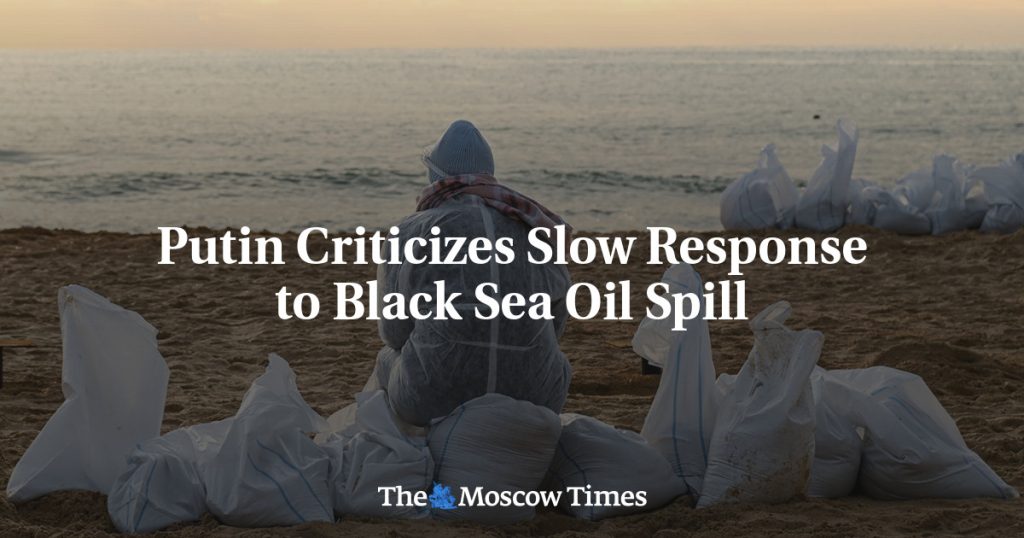Summarize this content to 2000 words in 6 paragraphs
President Vladimir Putin on Thursday criticized Russian officials for their slow response to what he described as the country’s most serious environmental disaster in recent memory.
“This is practically one of the most serious environmental challenges we’ve faced in recent years,” Putin said during a televised cabinet meeting, his first of the year. “The information I receive leads me to conclude that everything being done to minimize the damage is clearly insufficient so far.”
The oil spill began on Dec. 15, when two aging tankers carrying 9,200 metric tons of heavy fuel oil were damaged by a storm in the Black Sea. It has since polluted coastal areas in southern Russia’s Krasnodar region and the annexed Crimean peninsula, prompting authorities to declare an emergency.
Emergency Situations Minister Alexander Kurenkov reported that the tankers are still leaking oil daily. The type of fuel involved — M-100 grade mazut — is particularly challenging to clean up because it sinks below the water’s surface, according to officials.
news
‘Left to Fend for Themselves’: Volunteers Step Up as Russian Government Falters in Black Sea Oil Spill Response
Read more
Putin ordered the creation of a rapid response center to accelerate cleanup efforts and said that “everything must be done to stop the oil leaks from the submerged tankers.”
During Thursday’s cabinet meeting, Kurenkov said a specialized oil removal system had been brought from St. Petersburg and was ready for use.
Putin expressed gratitude to volunteers who have been working to clean oil from beaches, urging officials to match their dedication. “I hope that officials will treat the work of minimizing the impact of this disaster with an equal sense of responsibility,” he said.
He also directed officials to address “technical, financial, and technological problems” and develop a comprehensive plan to mitigate the spill’s economic and environmental effects. Most of the cleanup work, he added, must be completed by spring and summer when rising water temperatures are expected to push more of the oil to the surface.
A Message from The Moscow Times:
Dear readers,
We are facing unprecedented challenges. Russia’s Prosecutor General’s Office has designated The Moscow Times as an “undesirable” organization, criminalizing our work and putting our staff at risk of prosecution. This follows our earlier unjust labeling as a “foreign agent.”
These actions are direct attempts to silence independent journalism in Russia. The authorities claim our work “discredits the decisions of the Russian leadership.” We see things differently: we strive to provide accurate, unbiased reporting on Russia.
We, the journalists of The Moscow Times, refuse to be silenced. But to continue our work, we need your help.
Your support, no matter how small, makes a world of difference. If you can, please support us monthly starting from just $2. It’s quick to set up, and every contribution makes a significant impact.
By supporting The Moscow Times, you’re defending open, independent journalism in the face of repression. Thank you for standing with us.
Continue
Not ready to support today? Remind me later.
×
Remind me next month
Thank you! Your reminder is set.
We will send you one reminder email a month from now. For details on the personal data we collect and how it is used, please see our Privacy Policy.


